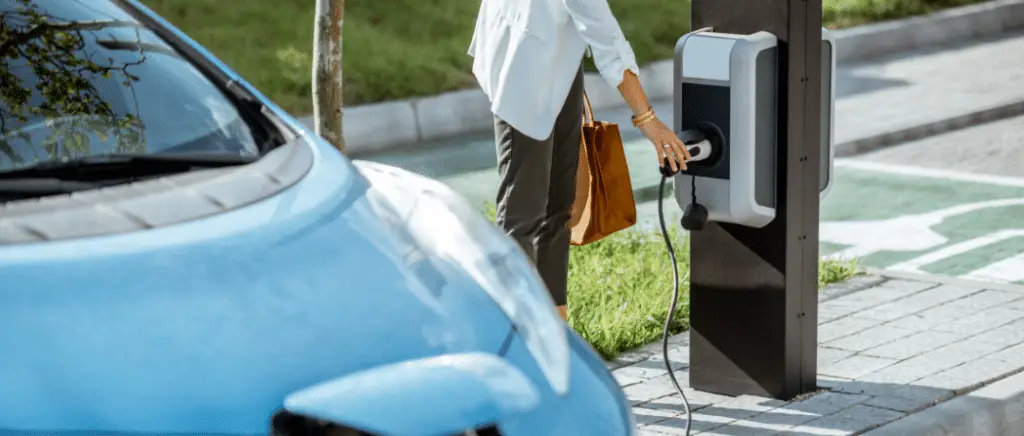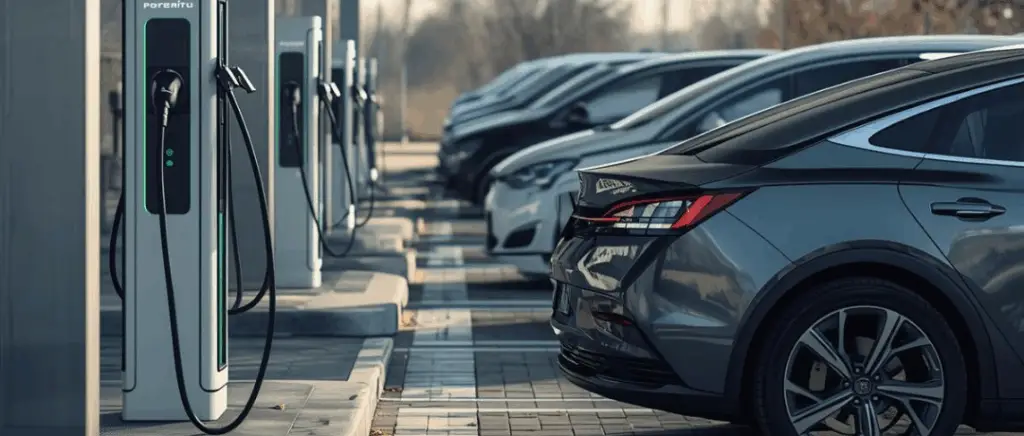Take advantage of our leasing offers for electric cars
What are the costs of an electric vehicle for a self-employed professional?
Before getting to the heart of the matter, let's look at the different costs you can expect to pay for an electric vehicle. When you are in possession of a so-called clean vehicle, the costs to be expected are as follows:
Mileage costs
Depending on the type of vehicle and engine, kilometre scales have been defined by the tax authorities, and from 2021 onwards there will be a new tax rate. a 20 % increase in mileage allowance has been applied to electric vehicles. This is a tax advantage. In 2022, this increase has been raised to 10 %.
Here is a table showing the mileage costs for an electric vehicle used for business travel:
| Puissance administrative (en CV) | Distance “d”* de 1 à 5 000 km | Distance “d” de 5 001 à 20 000 km | Distance “d” supérieure à 20 001 km |
|---|---|---|---|
|
3 CV and less
|
d x 0.529
|
(d x 0.316) + 1,065
|
d x 0.370
|
|
4 CV
|
d x 0.606
|
(d x 0.340) + 1 330
|
d x 0.407
|
|
5 CV
|
d x 0.636
|
(d x 0.357) + 1,395
|
d x 0.427
|
|
6 CV
|
d x 0.665
|
(d x 0.374) + 1,457
|
d x 0.447
|
|
7 CV and more
|
d x 0.697
|
(d x 0.394) + 1,515
|
d x 0.470
|
*The unit (d) corresponds to the distance travelled in kilometres.
For example, if 3,000 km were driven for business purposes in 2022 in a 5 HP vehicle, the service provider could claim actual expenses of €1,908 (3,000 km x 0.636).
Self-employed professionals: deductible vehicle expenses
As a self-employed professional, you can deduct the cost of acquiring an electric vehicle from your taxable income.
When a self-employed professional wishes to acquire a electric vehicle for professional useIf the vehicle is registered as a business asset, it can be used to deduct the cost of acquiring and maintaining the electric vehicle. However, if the vehicle is a private asset, the conditions for deduction will vary.
Business expenses: top-up costs
When you own an electric vehicle, it's essential to think about the cost of recharging. There are 2 ways of doing this:
- deduct the cost of electricity consumption in the case where the the vehicle is recharged at home
- if charging is carried out at public charging points, charging costs do not need to be deducted. For accounting purposes, you only need to keep the recharging invoices in a safe place.
Liberal professionals and electric vehicles: insurance and maintenance costs
To cover all kinds of risks associated with electric vehicles, you need to insure your vehicle, and this also requires an investment. It's considered an expense, insurance costs can be deducted from taxable professional income.
As mentioned above, if the electric vehicle is leased, insurance costs may be included in the rent which means fewer charges for the tenant.
This also applies to vehicle maintenance costsincluding maintenance and repair.
Electric vehicles: bonus to further reduce business expenses
Did you know that there is financial aid available to help you reduce your business expenses even further? Assistance is available for both private individuals and professionals.
Electric vehicles: national and local financial aid
On the one hand, you have the financial support offered by the government to encourage motorists to switch to electric mobility.
- environmental bonus Ecological bonus: aimed at buyers and leasers (with a leasing contract of more than 2 years), the ecological bonus is capped at €3,000 for legal entities for the purchase of a low-polluting vehicle. For the ecological bonus to be accessible, the purchase cost of a vehicle must be a maximum of €47,000 at a rate of 27 % inclusive of all taxes,
- conversion premium In addition to the ecological bonus, the conversion premium is also available. The principle is that by putting an old thermal vehicle the motorist can obtain the following a bonus of up to €4,000 for the purchase of a new or used electric vehicle. What's more, the ecological bonus and the conversion premium can be combined,
- additional premium for private individuals and professionals living or working in a ZFE-m (Low Emission Mobility Zone), they can get €1,000,
- local aids Electricity: many regions, départements and towns offer grants to encourage people to switch to electric mobility and install charging points. The amounts vary from one locality to another. These local grants can also be combined with the schemes mentioned above,
- become : Coming soon is designed to help motorists to install charging points for their electric vehicles,
- TVS applicable to internal combustion vehicles electric vehicles are exempt from TVS (Taxe sur les Véhicules de Sociétés), as they are said to be 'clean' and emit less than 20g/km of CO2. Which is a good way of reducing business costs,
- toll prices If self-employed professionals regularly travel by electric vehicle and use toll roads, a discount of 5 % is granted to them thanks to an electronic toll tagfor 1 year on certain motorways in France, with no minimum return journey:
- SANEF/SAPN network
- APRR/AREA network (north-east France)
- ATMB (Autoroute et Tunnel du Mont Blanc) network: until 31 December 2023, this network is offering an even higher discount to 70 % for drivers of electric vehicles, with an annual subscription of €1.90.
Since 1ᵉʳ February 2023, this discount has been in place for electric vehicles, to cope with inflation in tolls, fuel and electricity.
In fact, we've listed a few tips for coping with rising electricity bills and help you recharge your electric vehicle.
- zero-rate mobility loan (PTZ-m) Since 1 January 2023, the government has introduced a zero-rate loan for the purchase of an electric vehicle weighing up to 2.6 tonnes and emitting less than 50g/km of CO2. The aim of this scheme is to borrow money without paying interest.
A number of conditions must be met to qualify for this credit:
- be an individual with a reference tax income per unit of no more than €14,089,
- be a legal entity with fewer than 10 employees and annual sales or balance sheet total for the previous financial year of less than or equal to €2 million,
- be domiciled in or near a low-emission mobility zone (ZFE-m) (for individuals or companies),
- the purchase price under a long-term or leasing contract must be €47,000 (inc VAT) for a passenger car and €60,000 (inc VAT) for a van (before deducting government grants).
To find out which grants you are eligible for, you can run a simulation with our online platform.
If you need more information about state aid for for the purchase of an electric vehicle.
Business expenses: leasing an electric vehicle
Owning an electric vehicle for a self-employed professional can be achieved either by purchasing or leasing. Choosing the leasing an electric vehicle can help reduce business expenses.
As a reminder, leasing can be done by :
For business use, we suggest that you opt for long-term leasing (LLD). This allows you to deduct the costs associated with leasing and maintaining your electric vehicle. What's more, it will maximise thedepreciation of the electric vehicle and reduce tax costs.
Regardless of the type of finance you choose, leasing an electric vehicle offers a number of advantages, including :
- by having a fixed rent that is known in advance, it will be easier to control the company's cash flow,
- the owner offers a wide choice of electric vehicles. In this case, it will be easier for the lessee to choose a vehicle that meets the needs of the company and its employees, if there are any,
- the lessee can change vehicles on a regular basis. As business needs evolve, so do electric vehicles, in terms of equipment, comfort and technology,
- services are included in the rent, including maintenance and insurance for the electric vehicle
- by leasing a vehicle, the lessee will not have to deal with the resale of the vehicle. That's one less burden.
To find out more, click here: depreciation on long-term leasing: how does it work?
Discover our exclusive offers
Tax incentives for electric vehicles
With an electric vehicle, business expenses can also be reduced for tax purposes. Firstly, with the total or partial exemption from the proportional regional tax on the electric car registration document.
In this case, here are the costs and taxes for the registration certificate depending on the region:
| Régions | Prix par CV | Exonération véhicule propre |
|---|---|---|
|
Île-de-France
|
46,15 €
|
100 %
|
|
Burgundy-France-Comté
|
51 €
|
100 %
|
|
Corsica
|
27 €
|
100 %
|
|
New Aquitaine
|
41 €
|
100 %
|
|
Hauts-de-France
|
33 €
|
100 %
|
|
Auvergne-Rhône-Alpes
|
43 €
|
100 %
|
|
Normandy
|
35 €
|
100 %
|
|
Pays-de-la-Loire
|
48 €
|
100 %
|
|
PACA
|
51,20 €
|
100 %
|
|
Great East
|
51,20 €
|
0 %
|
|
Occitania
|
44 €
|
0 %
|
|
Brittany
|
55 €
|
0 %
|
|
Centre-Val de Loire
|
49,80 €
|
50 %
|
|
Guadeloupe
|
41 €
|
0 %
|
|
French Guiana
|
42,50 €
|
0 %
|
|
La Réunion
|
51 €
|
0 %
|
|
Martinique
|
30 €
|
0 %
|
|
Mayotte
|
30 €
|
0 %
|
Good to know: taxpayers wishing to install an electric vehicle charging point in their home are entitled to the tax credit regardless of income (MaPrimeRénov'). The scheme, which was due to expire in December 2023, has been extended by 2 years for costs paid up to 31 December 2025.
Conclusion
Now that electric vehicles are being touted as one of the solutions for tackling global warming, it's time for all professionals to make the energy transition. For the self-employed, electric vehicles are also accessible, whatever your professional activity, and at a reduced cost by applying the various aids offered by the State and the region.
We have also 6 electric cars for the self-employed.
To find out more, find out how tax exemption for your electric car in 2023 as a self-employed professional.
































